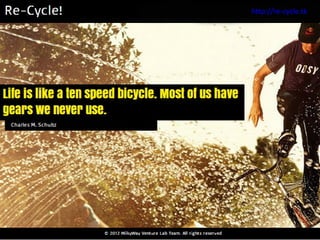Recycle
- 2. About us When Venture-lab fall 2012 courses started, a group of students, marketing responsible, entrepreneurs and engineers met together and gave birth to Milky Way team with a revolutionary idea: recycle pollutant materials and create greener bike. We choosen the bike market because the core of our group has a lot of experience in creating professional ride bike yet (http://www.milkywaybikes.com/). Following, many people appreciated the idea, and the most proud talent from all over the world joined to our group. Designers, financial and students of different countries joined to our project, and for this weĪ»re leading this course until the end! ?
- 3. The Idea Someone needs... our help! Bulk of people founds no alternative to an harmful lifestyle, both for themselves and the world around them. We know that isn't that so! Imagine a new way of moving: no car insurance or fuel needed, no pollutant parts; distnguish yourself using eco-friendly and high tech components at the same time. If you are interested, you can learn more on our dedicated website: http://re-cycle.tk Sales and Distribution Based on initial local based selling model (here in Bologna, Italy), people can contribute to their bike construction, bringing broken bike part. Partnership with the main waste management company, like HERA, is a necessary requirement for the re-cycle of pollutant material
- 4. What people say We defined our idea, then we asked some opinions to interested customers by many surveys. Collecitng data from 131 customers! (Here one of our surveys) Here are our consideration: People feel involved in green activities, and the customization causes enthusiasm and curiosity. Nowadays, the economic background helps our point of view, because a new bike reduces fuel consumption & pollution, and, if making this one can be greener too, it will be better. However, bulk of them feel unsafe about recycling processes and final price. This is largely comprensible, given that a Recycled Bike offers the same service of a classical bike. We have to improve our engineering implant to make cheap and durable recycled bikes. Otherwise, potential customers react well to simple and cheap local based marketing actions, just like the one that we did.
- 5. Sales & Partnership In our Idea, Sales, Partnership and Distribution channels are part of the same mechanism. Our sales are related on Partnership: since many customers doubt about quality of our bikes, we need extreme sport partnership (just like Red Bull or Monsters do) to show that our bikes are green, stylish, resistant. Partnership for pollutant and recyclable materials are equally important. Distribution channel will initially be based on local sale: an open space for exhibition, free trial self-constructing. This will contain costs.
- 6. Costs Costs are the critical point of our project: we offer re-cycled, durable and customizable bikes, that is possible but not simple. Since customers will pay a re-cycle bike equally or less than a classical bike, we need to contain costs on production too. This will be possible using existant production chain, implementing the re-cycling area, and sharing same technology for more than two model, just like happens in automotive. With economies of scale and experience graphs, the plant will be cheaper in following periods.
- 7. Revenue model Revenue model is really simple: customers will pay for their bike at the moment. Alternative revenues are not excluded. For example, we could make the customer pay just the real cost of the bike, receiving the rest in hours of work (i.e. constructing bikes for people that want just the complete product). The other important part of the revenue model regards green and social revenues: we need to see if there are fiscal and financial benefit for those revenues.
- 8. Risks Our idea has risks due to affordance of bike and engineering: also if we product re-cycled bike we are subject to same construction standards. This will make costs higher. We have to review production costs with few engineers and create the first real prototype
- 9. Funding In our researches, we found an interesting example of re-cycled bikes fundraising on kickstarter, started just the day after our first assignment (21 November!). This shows that all is possible, and we can reach the target!
- 10. Thank you 4 seeing! If you are interested in our business, just check at http://re-cycle.tk and fill the contact section. We believe in this idea, and we hope that, after this presentation, you trust in it too (almost a little ?) The MilkyWay Team










